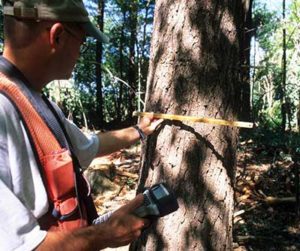Foresters vs. Loggers
What’s the difference between a forester and a logger?
Caring for a woodland often requires assistance from both foresters and loggers. Here we describe what each of these professionals can offer and what to expect when you work with them.

Foresters
Foresters address the needs of woodland owners through proper woodland care. Trained foresters hold a university degree in forestry or forest sciences. Their broad, formal education along with practical work experience make them uniquely qualified to consider big picture issues and opportunities even as they work to address your specific goals.
The help foresters can offer goes far beyond inventorying and appraising trees before a harvest or other timber-related activities. Foresters also assist in a variety of management goals and practices including writing management plans, controlling invasive species, maintaining tree health, and many others.
Read about the types of foresters (public vs. private) and what they do
Loggers
Loggers are in the business of bringing forest products to market through cutting trees, removing logs from woodlands, and hauling them to mills for processing. They may operate independently or be employed by a mill. Loggers use chainsaws and/or processors to fell trees; skidders (with a cable or grapple) to haul logs out of the woods; and logging trucks to transport logs to mills.
Typically, high-quality logs are hand-felled and cut to length using chainsaws to maximize economic value. High-volume products, like pulp, on the other hand, are usually harvested using mechanized equipment like a processor.
